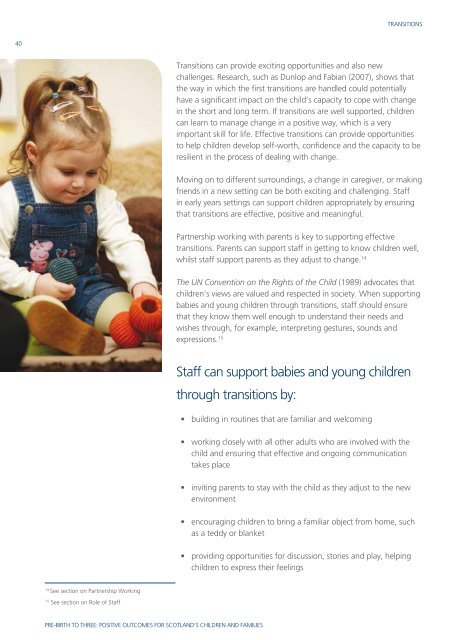Pre-Birth to Three guidance (2.3 - Education Scotland
Pre-Birth to Three guidance (2.3 - Education Scotland
Pre-Birth to Three guidance (2.3 - Education Scotland
You also want an ePaper? Increase the reach of your titles
YUMPU automatically turns print PDFs into web optimized ePapers that Google loves.
40<br />
14 See section on Partnership Working<br />
15 See section on Role of Staff<br />
PRE-BIRTH TO THREE: POSITIVE OUTCOMES FOR SCOTLAND’S CHILDREN AND FAMILIES<br />
TRANSITIONS<br />
Transitions can provide exciting opportunities and also new<br />
challenges. Research, such as Dunlop and Fabian (2007), shows that<br />
the way in which the first transitions are handled could potentially<br />
have a significant impact on the child’s capacity <strong>to</strong> cope with change<br />
in the short and long term. If transitions are well supported, children<br />
can learn <strong>to</strong> manage change in a positive way, which is a very<br />
important skill for life. Effective transitions can provide opportunities<br />
<strong>to</strong> help children develop self-worth, confidence and the capacity <strong>to</strong> be<br />
resilient in the process of dealing with change.<br />
Moving on <strong>to</strong> different surroundings, a change in caregiver, or making<br />
friends in a new setting can be both exciting and challenging. Staff<br />
in early years settings can support children appropriately by ensuring<br />
that transitions are effective, positive and meaningful.<br />
Partnership working with parents is key <strong>to</strong> supporting effective<br />
transitions. Parents can support staff in getting <strong>to</strong> know children well,<br />
whilst staff support parents as they adjust <strong>to</strong> change. 14<br />
The UN Convention on the Rights of the Child (1989) advocates that<br />
children’s views are valued and respected in society. When supporting<br />
babies and young children through transitions, staff should ensure<br />
that they know them well enough <strong>to</strong> understand their needs and<br />
wishes through, for example, interpreting gestures, sounds and<br />
expressions. 15<br />
Staff can support babies and young children<br />
through transitions by:<br />
• building in routines that are familiar and welcoming<br />
• working closely with all other adults who are involved with the<br />
child and ensuring that effective and ongoing communication<br />
takes place<br />
• inviting parents <strong>to</strong> stay with the child as they adjust <strong>to</strong> the new<br />
environment<br />
• encouraging children <strong>to</strong> bring a familiar object from home, such<br />
as a teddy or blanket<br />
• providing opportunities for discussion, s<strong>to</strong>ries and play, helping<br />
children <strong>to</strong> express their feelings

















